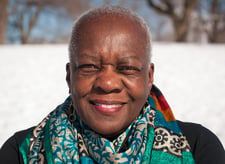Dreams, Calling, Suffering, and Individuation: Finding Light in the Darkness An Interview with Jungian Analyst and New Pacifica Core Faculty Member, Fanny Brewster. A Guest Post by Bonnie Bright, Ph.D.
Fanny Brewster first came to Pacifica as a student because she was interested in studying dreams. Once armed with her doctorate and a strong foundation in depth psychology and dreamwork, she identified a desire to go on and become a Jungian analyst, and synchronistically, now finds herself returning to Pacifica to teach as core faculty in the Clinical Psychology program there.
On Dreams and Dreamwork
Brewster remembers that she began writing down her dreams as early as ten or eleven years old, and the interest has never abated. While working as a speech pathologist and living in Berkeley, California, she participated in dream groups conducted by Jungian analyst Strephon Williams[1], who also co-founded the The Association for the Study of Dreams. Once at Pacifica, a rich, new part of her life began and she was finally able to look at the unconscious in a more public and focused way, she reports. Professors were talking about dreams in the classroom, and she recalls how exciting it was to have the literature to read in order to expand her understanding.
Now, as a Jungian analyst herself, Brewster has come to understand how important it is to be able to access our unconscious material. She believes it is essential for our psychological wellness. Dreamwork, in particular, can show us a direction for our lives, she now knows. Dreams serve to orient us psychologically and emotionally, and suggest how we might do things differently if we aren't entirely comfortable with where we are in our lives.
Part of C.G. Jung’s legacy was to help direct us towards the understanding that we can't just be ego driven; that there is an unconscious place which he termed the objective psyche that we can fall into via the dream world. This innate intelligence makes this kind of wisdom available to each one of us if we're actually willing to open to it, enabling us to be better humans and better able to be connected with ourselves and with others in the collective as well.
 While there are different avenues for discovering the best way for us to work with our dreams, there’s really no “best” way to work with them, Brewster believes. However, there are some guidelines that can be useful, and working with a Jungian analyst or depth-oriented dream worker can provide guidance when one first begins. Jung, for example, advocated looking at the dreamer's associations. In other words, what can the dreamer think of that relates to dream imagery? In the process, it can be important to look at symbols—not necessarily from a book, Brewster notes, but specifically at what the images that show up in dreams mean to the dreamer personally.
While there are different avenues for discovering the best way for us to work with our dreams, there’s really no “best” way to work with them, Brewster believes. However, there are some guidelines that can be useful, and working with a Jungian analyst or depth-oriented dream worker can provide guidance when one first begins. Jung, for example, advocated looking at the dreamer's associations. In other words, what can the dreamer think of that relates to dream imagery? In the process, it can be important to look at symbols—not necessarily from a book, Brewster notes, but specifically at what the images that show up in dreams mean to the dreamer personally.
When Brewster offers dream workshops, she likes to use writing as a way of expressing dreams. Turning the dream into a poem is another technique Brewster likes in order to deepen the understanding. Other creative processes such as drawing, painting, movement, dance, or active imagination, a technique Jung developed in which the dreamer can re-enter the dream and become actively involved with the images that emerge, are also powerful ways to gain insight into what the dream means.
 Sometimes in a dream groups, Brewster finds that the dreams that are worked are collective dreams which seem to belong to everyone in the group. Because we live in challenging times where we're activated by politics and current events, collective dreams often seem to express some kind of different reality than our waking reality, and they mirror that wake state reality of the collective.
Sometimes in a dream groups, Brewster finds that the dreams that are worked are collective dreams which seem to belong to everyone in the group. Because we live in challenging times where we're activated by politics and current events, collective dreams often seem to express some kind of different reality than our waking reality, and they mirror that wake state reality of the collective.
On The Call to Individuation
Working with dreams allows us to tap into the psyche, which leads us in a certain direction in the process of becoming more whole, which Jung referred to as individuation. James Hillman talked about how, imprinted in every acorn, there's a massive oak tree. In the individuation process, we have to go through both light and darkness in order to grow emotionally and psychologically, Brewster agrees. Answering the call to individuation brings us to onto a path of healing and feeling alive, and we are all called to this work.
In her training program to be a Jungian analyst, there was a lot of emphasis on the importance of the call. Brewster considers the idea of a “call” as a response that happened in the African-American tradition, but she also the references the “siren’s call” in Greek Mythology. Sometimes when we follow a call, we fall in an unhappy way—much like the seamen who traveled with the Greek Odysseus did when they responded to the siren’s call, she points out. Rather than covering our ears to a calling that may not have the best outcome for us, we sometimes proceed down a path that brings us suffering and grief. While these kinds of experiences are difficult for the ego, they are often in the best interest of the unconscious— what Jung called the “objective psyche”—which sees the bigger picture of the growth that can occur when we experience a fall.
Either way, calling is mandatory, Brewster believes. It happens for all of us. But, hopefully, as we age, we begin to see patterns in the actions we take and the calls we pursue, recognizing the threads that run through our lives. When we begin to gather those threads, we bind them with something called “calling,” Brewster states. Part of the work of depth psychology, in Brewster’s opinion, is that there is a calling and we need to trust that. That's also the message and the material that clinicians and therapists often end up exploring in the analytical work they do with others. Often, it's about helping others understand and find their calling.
While many of us end up in situations that cause us distress or suffering, we can work on healing from false turns we have taken and find something that's more authentically reflective of who we are. Ultimately, we understand our calling from working the material of the unconscious, as well as through ego discrimination. We can use both of those paths together in helping us find our way along the path of individuation. And, the process of individuation never comes to an end, Brewster maintains. We're can expect to continuously work on ourselves for the entire lifetime: the healing is ongoing.
On Suffering and the Individuation Process
It may be all too easy to get stuck when we perceive the patterns of ecological destruction and political conflict we are witnessing these days, and to feel disquiet and even grief about what's happening in the world around us. A lot of people are suffering because they don't know what to make of what's going on in the culture and on the planet, and they feel powerless to do anything about it. We are affected by daily news about the extinction of species, loss of life, and people mistreating one other in sometimes terrible ways.
Brewster, who has written about grief quite extensively, offers some thoughts on how a depth psychological perspective can aid us, and ways we can work with the feelings of grief, loss and unrest that are bubbling up for many of us today.
We are all engaged in suffering, she points out. Part of our understanding of depth psychology is that it is inevitable: we are going to have painful experiences or experience the loss or withdrawal of love. Sometimes our suffering centers on witnessing others in pain. She cites a recent incident in which two men were killed in Oregon because they tried to help two young teenage Muslim girls who were being harassed by a man on a train[2]. For Brewster, this is an important example of how we are sometimes asked to show up for others and have courage for others in a moment when we might be otherwise totally distracted by our own lives.
We live in a political climate now that almost breeds this kind of taunting of the other, she notes, and projecting one’s own stress onto someone seen as “other” as the assailant in Oregon was doing when he was engaging with these two young Muslim women. This kind of incident has a ripple effect like a rock being thrown into a lake. It is affecting our collective psyche, as well as on an individual level. We have to bring that to consciousness so that we can, in that moment, acknowledge that we may be taking a risk by stepping forward and actively engaging, but to do it anyway.
Brewster, who marched against the war in Vietnam, for women's rights, and for civil rights in the 1960s, has always carried a strong belief that she has to be active. She knows that she could suffer as a result of taking an active stance because she lived through a generation where people died for what they said. Dr. Martin Luther King died because of what he was trying do for African Americans, she points out, and so did Robert Kennedy. She came of age in a generation where assassination was very possible, and with a lot happening in government, civics, and in collective society. Then, people were active because they understood a profound wish for our society to be different, and it’s not different today.
Being a depth psychologist means being engaged, she emphasizes—being engaged with the lives, not just of your analysands, or clients, and those that touch you in the temenos or container of therapy—but also in being engaged with what's going on in the collective. One of the things that Jung talked about was how individuation was really about leading us back into the collective. The work is to work on individuation, and then to be able to go back out into the world and be a part of raising consciousness and deepening consciousness in the world, and being actively engaged with others in the collective.
 In the end, depth psychology is deeply concerned with suffering, Brewster suggests. It's about awareness. It's about commitment. It's about being human in a way that requires you to suffer. Psychotherapy entails learning about one's own anxiety, terrors, and fears, and then going deeper into that aspect of suffering, in order to be able to come out the other side.
In the end, depth psychology is deeply concerned with suffering, Brewster suggests. It's about awareness. It's about commitment. It's about being human in a way that requires you to suffer. Psychotherapy entails learning about one's own anxiety, terrors, and fears, and then going deeper into that aspect of suffering, in order to be able to come out the other side.
With depth psychology, you learn that the way out is through Brewster insists. Going through darkness and not-knowing becomes a psychology of discovery, of finding light within the darkness, which ultimately is a source of great richness. Going through the suffering and then being able to then set foot out into the real world, and apply the gifts we receive through that process; to use what we’ve learned when difficulties come at us; to make movement on an individual level can instigate real change in the wider world.
One of the teachings of Jungian psychology is that we are each responsible for ourselves as individuals. This is not even about individuation necessarily. It's about listening to something inside that speaks to our morality, and allowing it to guide us. It comes from the inside out. In that way, going through what might sometimes seem like the trauma of self-understanding; of being willing to see our own weakness, and beginning to understand how we can become stronger becomes not just in service to ourselves, but a service to others: to family, to friends, to the larger collective—even to someone who is being harassed or disrespected in the public arena. “How do I show up in each one of those ways?” Brewster asks.
These are just a few of the empowering ideas students in Pacifica’s Clinical Psychology program will be exposed to as Brewster passes on her wisdom and experience starting this Fall as she takes on the mantle of core faculty member there.
Listen to the full audio interview with Fanny Brewster here: (approx. 34 minutes)
[1] Learn more about the life and work of Strephon Kaplan-Williams (1934-2009) on this memorial page: http://www.dreamwork-psychology.com
[2] See a New York Times report on this incident that occurred in May 2017 in Portland, OR
 Fanny Brewster is a faculty member of the New York C.G. Jung Foundation where she teaches a variety of classes and gives public forum lectures on Jungian related topics. While a Board Member with the New York Analytical Psychology Club, Dr. Brewster developed and led experiential workshops on Dreams, Creative Writing and Mythology. She has a Master of Fine Arts degree in Creative Nonfiction and has published articles such as, “Wheel of Fire: The African American Dreamer and Cultural Consciousness” which appeared in the Jung Journal Psyche and Culture among others. Dr. Brewster has received two Gradiva Award nominations for her writing, from the National Association for the Advancement of Psychoanalysis. She is also new core Faculty in the Clinical Psychology Program at Pacifica Graduate Institute.
Fanny Brewster is a faculty member of the New York C.G. Jung Foundation where she teaches a variety of classes and gives public forum lectures on Jungian related topics. While a Board Member with the New York Analytical Psychology Club, Dr. Brewster developed and led experiential workshops on Dreams, Creative Writing and Mythology. She has a Master of Fine Arts degree in Creative Nonfiction and has published articles such as, “Wheel of Fire: The African American Dreamer and Cultural Consciousness” which appeared in the Jung Journal Psyche and Culture among others. Dr. Brewster has received two Gradiva Award nominations for her writing, from the National Association for the Advancement of Psychoanalysis. She is also new core Faculty in the Clinical Psychology Program at Pacifica Graduate Institute.
 Bonnie Bright, Ph.D., is a graduate of Pacifica’s Depth Psychology program, and the founder of Depth Psychology Alliance, a free online community for everyone interested in depth psychologies. She also founded DepthList.com, a free-to-search database of Jungian and depth psychology-oriented practitioners, and she is the creator and executive editor of Depth Insights, a semi-annual scholarly journal. Bonnie regularly produces audio and video interviews on depth psychological topics. She has completed 2-year certifications in Archetypal Pattern Analysis via the Assisi Institute and in Technologies of the Sacred with West African elder Malidoma Somé, and she has trained extensively in Holotropic Breathwork™ and the Enneagram.
Bonnie Bright, Ph.D., is a graduate of Pacifica’s Depth Psychology program, and the founder of Depth Psychology Alliance, a free online community for everyone interested in depth psychologies. She also founded DepthList.com, a free-to-search database of Jungian and depth psychology-oriented practitioners, and she is the creator and executive editor of Depth Insights, a semi-annual scholarly journal. Bonnie regularly produces audio and video interviews on depth psychological topics. She has completed 2-year certifications in Archetypal Pattern Analysis via the Assisi Institute and in Technologies of the Sacred with West African elder Malidoma Somé, and she has trained extensively in Holotropic Breathwork™ and the Enneagram.



